Divine Liturgy in Vodocha on the feast of Saint Nahum of Ohrid ( 03.07.2009 )
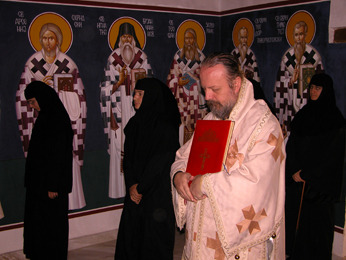
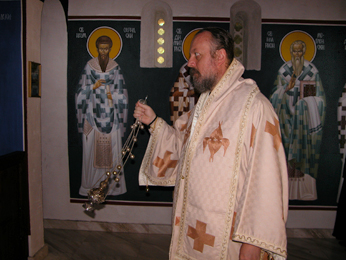
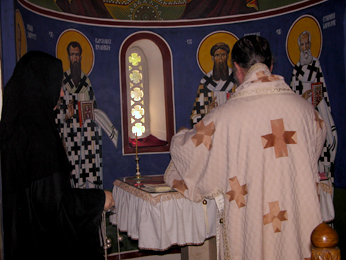
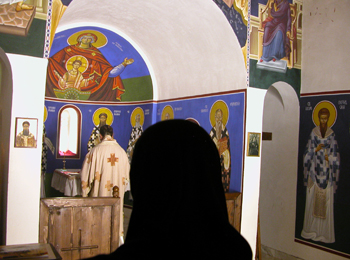
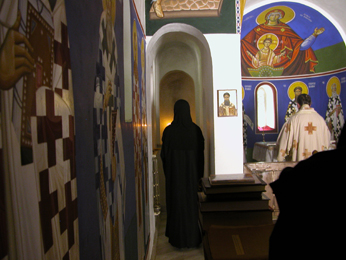
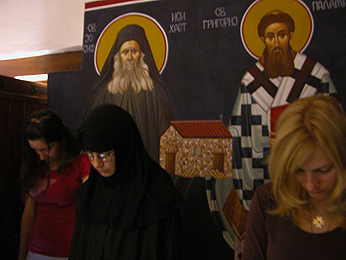
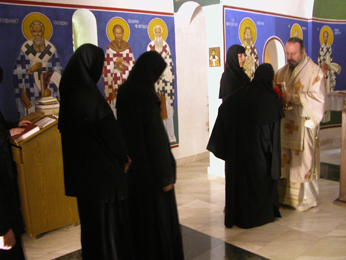
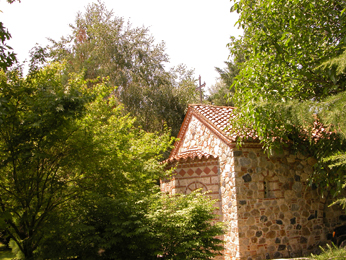
A sower went out to sow
Then the Lord spoke many things to them in parables, saying: “Behold, a sower went out to sow. And as he sowed, some seed fell by the wayside; and the birds came and devoured them.
Some fell on stony places, where they did not have much earth; and they immediately sprang up because they had no depth of earth. But when the sun was up they were scorched, and because they had no root they withered away.
And some fell among thorns, and the thorns sprang up and choked them.
But others fell on good ground and yielded a crop: some a hundredfold, some sixty, some thirty. He who has ears to hear, let him hear!” (Matthew 13:3-9).
The soil on which the Godman Jesus Christ sows His seed i.e. word is man’s heart. he sows it through the people who truly witness Him. They, for their part, sow the seed through their spoken or written word.
You remember from a previous homily that a ‘fisher of men’ can be called only a man with prayerfully illumined mind, a man with a word that springs from his purified heart and reaches to the depth of his fellowman’s heart, and a man with presence in power. In his presence passions paralyze, the demon flees far away, and his word brings light, strength, and hope in the other man’s heart. Also, even when such a man is no longer close to his fellowman and when the passion revives and when the demon comes back again, he does not abandon his fellowman. With the prayer in his heart he keeps the light, the strength, and the hope—that is, the seed he has sown in his fellowman’s heart. The seed which in synergy with the free will of the one in whom it is sown and aided by the grace of the Holy Spirit can sprout, grow, and bring forth fruit—liberation of the heart from the passions.
While reading the today’s parable of the sower, what attracted my attention the most was the part about the seed fallen among thorns, and so I thought: just as thorns are the obstacle for the field to yield a good crop, so are sins the obstacle for our heart to bear the good fruit of virtue. At that, I say to myself, the actual thorns resemble a sin with deeds, the leaves—a sin with words, while the branches—a sin with thoughts.
The thorns in the field of our heart—that is, our sins that we commit by deeds, words or thoughts, have certainly a root as well. What else could the root of the sin be if not the passions nested in our heart (the main—self-love i.e. the three subgroups—vainglory, avarice, and pleasure-indulgence). The captivity of the heart to passions does not allow the baptismal grace to manifest itself and freely act outside our heart, through our whole being and outside us. It does not leave space to the word sown in our heart to grow and bear the fruit of repentance i.e. a change of mind.
If we wish the seed to bring forth fruit, we must cleanse the ground of the thorns, root out the thorns. Yet, in order to get to the root, we must start destroying the thorns from the top. Hence, we must stop sinning in deeds, then in words, and finally in thoughts. The monastic must not only not sin with deeds and words, but also he must not accept and consent to any evil thought, since for him the thought has the gravity of a deed done. I am talking about the monastics who endeavor to reach the stage of illumination of the mind, as well as about them who wish to move on to the perfection possible here.
The unceasing oral invocation of Christ’s name, accompanied with attention and mourning, will inevitably reveal the passions hidden within us. Whenever we see clearly enough our passions, we should know that the energy of the mind is sufficiently purified. Then we likewise see how much they estrange us from God and how all the other people are better than us. And then we desire all the more to root the passions out and we say the prayer all the more fervently, all until it is accepted by the mind, and the mind, for its part, is in constant first beholding of the uncreated light. I have spoken to you about this before. In our mind we are trying to say the prayer continually, and it invisibly purifies the heart from the passions during that. And when, through the practice of prayer, the heart is sufficiently purified, the grace given at Baptism manifests itself and the prayer along with the mind descends in the heart. Then the mind in synergy with grace can freely act within the heart, cleaning the passions (roots) completely.
The open heart is fertile ground, for the second stage of spiritual growth, and the seed fallen on it can now freely give good fruit. For the first stage of spiritual growth it is the obedience. As for them who live in the world, it is the actual aid to ones in need.
All this does not mean that in our heart, in the process of purification from the passions, there is not one part which is good ground, one which is wayside, one which is a stony place, and a part with thorns. Thorns appear when we have no consistence in the struggle. We either struggle or sin, there is no third option. The part by the wayside means that we have no experience in the struggle. I am telling you something, yet the demon comes and erases it because it can be actively remembered only if it is carried out. The stony place is the area where the passions still reign, the self-love. Good ground is the faith in the Godman Jesus Christ poured out into obedience.
I just want to tell you that each of the situations with the seed can be interpreted separately for each of the stages of spiritual development, as well as each of them for itself. For instance, the seed fallen on a stony place, which springs up fast but also withers away fast, refers to people who, carried by first grace, take upon themselves even excessive feats, yet at the first more serious test of hiding of grace they sometimes fall even from the communion of the Church. As for the seed fallen by the wayside, I would not like to talk about that myself, I will leave that to you.
The bad thing is that the common end to the first three situations with the seed is the lack of fruit. For monastics that fruit is the mind-and-heart prayer. Not to say for everyone. And in general, we cannot speak of spiritual life, in the real sense of the word, without the gift of prayer in the heart. We can speak of ethics, of bon ton, yet not of Orthodox spiritual life as well. About it, as potential, we can talk even at the first stage, yet this only if we bring in line the mode of our life with the stage of purification of the heart from passions.
He who has ears, let him hear! Meaning: he who believes, let him fulfill! What do you think now, what does the seed fallen by the wayside mean?
Metropolitan Nahum of Strumica